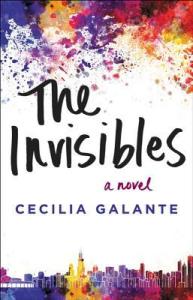The Book Itself: I like this splatter-paint, cityscape watercolor background. It’s what drew me to pick up the book and read the back in the first place.
My Review: Thrown together by chance as teenagers at Turning Winds Home for Girls, Nora, Ozzie, Monica, and Grace quickly bond over their troubled pasts and form their own family which they dub The Invisibles. But when tragedy strikes after graduation, Nora is left to deal with the horrifying aftermath alone as the other three girls leave home and don’t look back.
Fourteen years later, Nora is living a quiet, single life working in the local library. She is content to focus on her collection of “first lines” (her favorite opening lines from novels) and her dog, Alice Walker, when out-of-the-blue Ozzie calls her on her thirty-second birthday. But after all these years, Ozzie hasn’t called her to wish a happy birthday. Instead, she tells Nora that Grace attempted suicide and is pleading for The Invisibles to convene again. Nora is torn: she is thrilled at the thought of being in touch with her friends, and yet she is hesitant at seeing these women after such a long and silent period of time. Bolstered by her friends at the library, Nora joinsThe Invisibles in Chicago for a reunion that sets off an extraordinary chain of events that will change each of their lives forever.
The Invisibles is an unforgettable novel that asks the questions: How much of our pasts define our present selves? And what does it take to let go of some of our most painful wounds and move on?
When I became old enough to start reading books out of the “Young Adult” section in the bookstore, my mom and I had this frequent complaint that every single one seemed to feature a broken family. It wasn’t that we didn’t know people who grew up in a “broken” home (what a horrible adjective), or that we were cold-hearted and without sympathy. But it was a trope that every author clung to. Kind of like all of the vampire series after Twilight had its run. And the dystopian wave that is still eddying post-Hunger Games. That was probably why I began to turn to fantasy, picking up Lord of the Rings and Harry Potter.
It was a scenario I could not personally insert myself into. I was and am very fortunate to have a great relationship with both of my parents, who are still married to each other, in one house for the first eighteen years of my life. I still consider my mother to be my best friend. That’s a situation not everyone had growing up, and I tried not to take it for granted.
But I can still feel the sucker punch emotional reaction of a character or person in real life who grew up with so much against them. I knew going into The Invisibles that I might be in for a whole lot of hurt.
Because all our girls here came from broken homes. That’s what drew them together, literally – they lived in the same girl’s home through high school – and figuratively – meeting once a month for the sole purpose of giving each other comfort and support. But at a point, that background becomes a crutch for character building: it can be the character’s only defining trait, and it can get cloying.
Nora lives an incredibly private existence in the same town as the home for girls where they all grew up. She walks her dog, obsesses over the first lines in literature, and works at the library. That’s pretty much it. When Grace, her religious roommate from Turning Winds, tries to commit suicide, the bossy leader of the group, Ozzie, rallies them all for an intervention of sorts. This intervention turns into a rollercoaster, snowball-rolling slide of revelations and a digging up of the horrible secrets in the past.
And the main problem with all of the girls is that they have all grown into traits exhibited by their absent parents. “I am becoming my mother” is a little overused in several of the women. As is “I’m making up for the lack of love in my childhood.” I think that’s actually said a few times in the story. And the story gets a little heavy-handed with the metaphors/deep thoughts throughout. All of it begins to sound a little melodramatic, kind of like I’m reading a soap opera.
There is a twist having to do with Nora, but it is pretty obvious if you pay attention to her weird phobias and aversions. It does pack a huge, heavy, emotional punch though. I was certainly affected. It’s a horrifying, terribly sad event, that unfortunately doesn’t come as a great surprise, considering the beatings, physical and emotional, these women have taken.
It’s not a “nice” story, but it’s a good one. It is well-written, if a little too reliant on how an abusive and/or neglected past forms your future and the person you become. It isn’t necessarily a feel good read, but it’s emotional and at times, powerful.
My Grade: C
